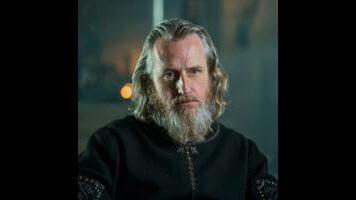A pair of kings regretfully ponder the inevitable on a haunting Vikings

“In The Uncertain Hour Before The Morning,” two kings remove themselves from the world for a night, only to confront the fact that the world will wait for no one, king or no. His reappearance teased last week when son Aethelwulf informed him of Ragnar’s return, King Ecbert tonight faces off with his nemesis. Brushing past the gloating Aethelwulf to where Ragnar sits in chains (and a hanging cage), Ecbert, now stooped and grizzled with the weight of the intervening years, dismisses everyone from the chamber with a brusque, repeated, “Leave.” Ragnar, brutally beaten and starving in his captivity, locks eyes with the king who ordered the slaughter of the Norse settlers, and summons a wry, “What took you so long?”
This episode, but for a momentous episode back in Kattegat we’ll get to later, is almost entirely a two-hander for Travis Fimmel and Linus Roache, as the two kings—one pacing in his finery, one chained and in rags—simply talk. And it’s mostly riveting. For all the hearty action and occasional melodrama, Vikings has truly been its best when it has captured the characters’ greedy joy in discovery. The characters who’ve most relished the unimaginable wealth of possibilities the Norsemen’s voyages have brought about—Ragnar, Ecbert, Athelstan—are all present here, with Ecbert finally introducing Ragnar to Alfred, Athelstan’s son with Judith. Fimmel, as ever, is most eloquent in silence and action, and, here, his stunned, adoring look at the child, and his tearful embrace of his late friend’s son, is one of the actor’s finest moments. When Ecbert begins to introduce the boy, Ragnar’s quiet “I know, without explanation” testifies to the bond that still remains—among all three men.
Roache and Fimmel match each other throughout the episode, their characters switching gears from wary antagonism, to drunken, philosophical sparring, and, finally, to the most profound and sorrowful understanding. Ecbert starts with the key to Ragnar’s cage in his hands, constantly fiddling with it, and asking his captive, “What would you do if I let you out?” Ragnar responds bluntly, “I would kill you—or not.” Ecbert lets him out (of the cage, if not the chains), and Ragnar doesn’t kill him. Instead, they—after Ragnar is assured that Ivar is safe and fed—spend the long night talking. It’s a singular conversation, one that, perhaps, no other two people in this world could have, the two tired kings speaking, again, as if the coming morning and its attendant, wrenching choices, were not coming.
From their first meeting (with the naked Ragnar dipping warily into Ecbert’s luxurious, pool-sized hot tub to parley), the English and the Norse leaders always recognized a similar spark of curiosity—and the loneliness that comes from being the only one in their respective worlds that seems to have it. After their initial sparring tonight, Ecbert offering an arch “mea maxima culpa” in response to Ragnar’s anger over his people’s murder, they settle into a bristly honesty that both men clearly have been longing for.
Part of that bond is their shared love of Athelstan, the holy man whose hunger for discovery remained uncoupled to any attendant ambition for power. Drunkenly discussing their friend’s fate (Ecbert having broken out the wine), both men recognize what they’ve lost in the monk, Ecbert stating, “We needed him. He never needed us.” The whole scene is a lovely mix of philosophical musing and tipsy bonding (Ragnar and Ecbert debate the existence of God, or the gods, like college sophomores lighting up their first-ever joint), with both rulers uneasily conceding that their respective faiths are deeply shaken, and that Athelstan’s, for all his divided loyalties, wasn’t. Exhausted, both men end the scene slumped on the floor facing each other, wearily.
“Is he with your gods or mine?”









![HBO teases new Euphoria, Larry David, and much more in 2026 sizzle reel [Updated]](https://img.pastemagazine.com/wp-content/avuploads/2025/12/12100344/MixCollage-12-Dec-2025-09-56-AM-9137.jpg)






























